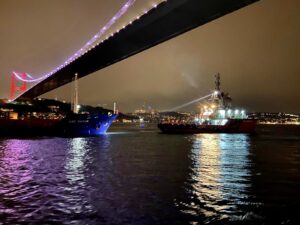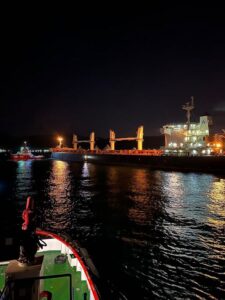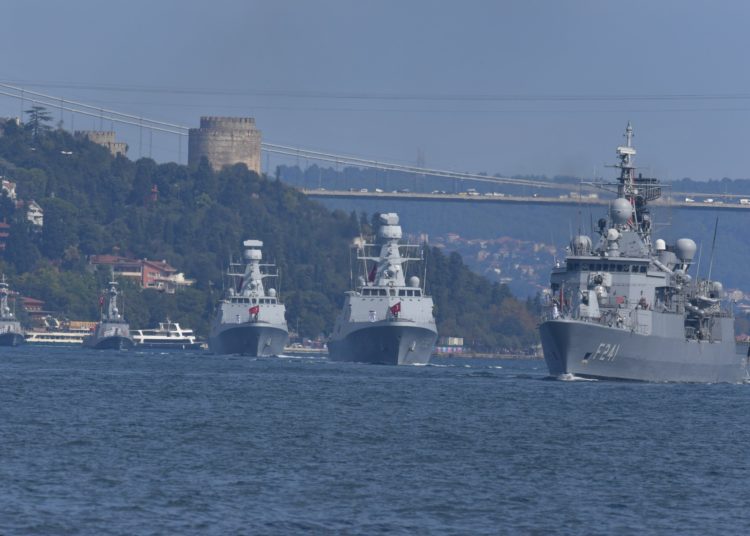Abdullah Bozkurt/Stockholm
Commercial ship traffic through Turkey’s Bosporus and Dardanelles straits saw a slight recovery last year following a previous low, while the number of warships dramatically decreased amid the Russia-Ukraine war between 2022 and 2024.
According to statistics obtained by Nordic Monitor, 39,000 vessels transited the Istanbul strait in 2023, up from 35,146 the previous year, marking the lowest figure in a decade. The traffic through Istanbul peaked in 2007 with 56,606 vessels, gradually declining before being significantly impacted by the Russia-Ukraine conflict.
The primary category of vessels utilizing the Istanbul strait was general cargo ships, followed by bulk grain carriers. Oil and liquefied gas tankers ranked third, followed by vessels carrying chemical products.
The most significant decline in maritime traffic was observed in warships. Prior to 2022, warships passing through the Istanbul strait averaged around 200 annually, peaking at well over 300 at times and dropping to as low as 100 other years. However, with the onset of the Russia-Ukraine war, the number of warships permitted to use the Istanbul strait decreased dramatically, with only 30 naval ships using the strait in 2022 and 33 in 2023.
This is because Turkey began enforcing the wartime provisions of the Montreux Convention, a treaty signed on July 20, 1936, by Turkey, Bulgaria, France, the UK, Australia, Greece, Japan, Romania, the Soviet Union and Yugoslavia. Starting in February 2022, it closed off the straits to warships from any country, regardless of whether they border the Black Sea, with an exception made for warships returning to a home base in the Black Sea.
This likely indicates that most, if not all, warships that traversed the Istanbul strait in 2022 and 2023 were Russian, as Ukraine does not possess a naval fleet.
The number of vessels that used the Turkish Straits in 2023:
A similar pattern of gradual decline over a decade was also observed in the transit of ships through the Dardanelles strait, although not to the same extent as experienced in the Istanbul strait. This is partly due to some of the traffic that uses the Dardanelles strait ends up in Istanbul without proceeding further to the Black Sea.
In 2023 there was a slight recovery as 44,892 vessels sailed through the Dardanelles, representing a 6 percent increase over the previous year.
Of these, a total of 46 naval vessels transited the Dardanelles in 2023, indicating that approximately a dozen warships remained in the Marmara waterway without proceeding further. These ships were believed to be owned by Turkey’s NATO allies. In 2022 the number was recorded at 34, with 24 warships using the strait in January and February before the Russian invasion of Ukrainian territory began.
It’s also interesting to note that Turkey did not allow any warships to pass through for six months in 2022. This suggests that Turkish authorities were stricter in enforcing the warship ban in 2022 compared to 2023, a year during which the number of warship passages on a monthly basis increased.

The statistics on traffic through the Turkish Straits are maintained by the Directorate General of Coastal Safety (Kıyı Emniyeti Genel Müdürlüğü, KEGM), which operates under the Ministry of Transportation and Infrastructure. KEGM is mandated by law “to enhance the safety of navigation and the protection of life, property, environment, and maritime security in Turkey’s maritime jurisdictional areas and Turkish Straits.”
The Turkish Straits are crucial waterways under Turkish control, spanning a total length of 164 nautical miles between the Black and Aegean seas. This includes the 37-nautical-mile-long Dardanelles (Çanakkale) strait, the 110-nautical-mile-long Marmara Sea and the 17-nautical-mile-long Istanbul strait.
Part of the reason for the decline in the number of vessels is that more ships with higher tonnage capacity have been utilizing the Turkish straits compared to ships with a smaller load capacity, reflecting a trend seen in the global shipping industry.
In 2022, 35,146 vessel passages were recorded in the Istanbul strait, with transit passages accounting for 58.8 percent of the total. This represents a decrease of 8.8 percent compared to the 38,551 passages recorded in 2021. The total gross tonnage of vessels decreased by 14.3 percent from the previous year to 541.5 million, while the total net tonnage decreased by 14.4 percent to 292.6 million. Additionally, the total cargo carried decreased by 17.6 percent from 465.4 million tons in 2021 to 383.3 million tons.
The 1936 Montreux Convention recognizes three types of passage for war vessels: in times of peace, in times of war and in times of an immediate threat of war. Unlike the concept of safe passage recognized by customary International law, the Montreux Convention imposes significant restrictions in terms of administrative and diplomatic protocols, volume-tonnage limits and duration of stay for foreign vessels passing through the Turkish Straits and their presence in the Black Sea.
During peacetime, light surface vessels (defined as warships displacing more than 100 tons but not exceeding 10,000 tons) of all nations may transit the straits after providing prior notice to Turkey as mandated by the convention. Turkey retains the authority to waive the notification requirement if the warships are passing through for the purpose of providing humanitarian assistance.
The number of vessels that used the Turkish Straits in 2022:
According to the convention, foreign countries are obligated to notify Turkish authorities prior to passage. Under Article 13, countries bordering the Black Sea must provide prior notification eight days before passage, while countries not located on the Black Sea must do so 15 days before passage. The passage must occur within five days after notification.
Naval ships such as submarines also need to pass during daylight and on the water, with some exceptions and rights provided exclusively for Black Sea littoral countries.
There are also restrictions on total tonnage and types of war vessels. According to Article 14, with the exceptions outlined in Article 3 of the convention and Supplement III, the maximum tonnage of foreign naval forces making a transit passage through the straits shall not exceed 15,000 tons. However, under Article 11, countries bordering the Black Sea may permit their vessels to exceed the limit set in Article 14, provided they are accompanied by no more than two destroyers or they transit alone. Anti-warplane vessels are not permitted to pass through the Turkish Straits.
Detailed restrictions are imposed on the total tonnage and duration of stay in the Black Sea for war vessels of countries not located on the Black Sea.
Naturally, in times of war, if Turkey is a belligerent, it has the authority to act as it deems necessary and is permitted to close the straits to all foreign war vessels. This right is also recognized for Turkey if it perceives an immediate threat of war.

Turkey has some leeway under Article 17, which permits a naval force of any tonnage or composition to make a courtesy visit of limited duration to ports in the straits at the invitation of the Turkish government. In such instances, the tonnage and numbers limitations of the convention do not apply. Warships of non-Black Sea powers may not remain in the Black Sea for longer than 21 days.
Despite being the subject of much discussion since its entry into force, the Montreux Convention has survived major crises, including World War II and the collapse of the Soviet Union and the Warsaw Pact as well as Russian conflicts with Ukraine and Georgia.
On February 28, 2022 President Recep Tayyip Erdogan said Turkey would implement a provision of Montreux in a way to de-escalate the Russian-Ukraine crisis. “We have decided to use the authority given to our country by the Montreux Convention regarding the ship traffic in the straits in a way that will prevent an escalation of the crisis,” Erdogan said, adding to that Turkey would not sever its ties with either Russia or Ukraine. He criticized NATO allies for not doing enough while noting that Turkey would fulfill its obligations as an ally.












